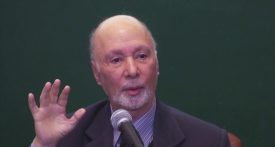Search results for tag "Virtue ethics" - 10 answer(s)
269
Vote
Read this anecdote, answer the two poll questions and share your comments for 2 weeks! On March 9, an article will be posted, presenting several notions relevant to this discussion along with some guidelines for a good practice.
Let us note at the outset that the point is not to reach an answer that would be “right” or “wrong” in the absolute sense. Reality is far too complex to be summarised in that way. This is the toy model of a “clinical case study”: a virtual exercise in the form a poll aimed exclusively at promoting reflection and exchanges.
Read more
321
Vote
If one quality had to be singled out as being primarily required to live an ethical life, it would without question be courage. This courage Aristotle considered to be “the first of human qualities because it is the quality which guarantees the others.”
Indeed, so many good intentions get crushed by the fear to expose oneself or to break the bonds that tie us to others! So many ambitious programs are carefully reflected upon and put forward only to wane and erode away in the face of weariness! Because courage is essential every step of the way: to make the inaugural move that marks the beginning, to dominate the fear of exposing oneself, to spontaneously assert one’s freedom while remaining loyal to the initial impetus, and finally to survive the long solitary struggle against despondency.
Read more
297
Vote
The parable of the Good Samaritan in the Gospel of Luke is brought up in the course of a discussion between Jesus and a man of law with regard to the question of what one ought to do “to inherit eternal life”. Referring to the answer given by the law the man quotes a verse […]
Read more
548
Vote
No one likes to think of themselves as dishonest. In fact, most of us don’t think they are. Yet who can assert that they have been fully righteous and honest in every situation they have encountered over the past month or year? How can this dichotomy be explained? What is it that pushes us to adopt dishonest behaviours and that shuts down our moral conscience when we do so?
In this insightful and thought provoking talk given at the RSA, Dan Ariely, best-selling author and professor of psychology and behavioural economics at Duke University, draws from experiments conducted among various groups of people in different parts of the world, as well as on personal experiences, to shed some light on these questions.
Read more
364
Vote
Why be humble?
If humility consists in resisting the pressure of pride—whose power we can sense—it most certainly requires an effort. As all efforts, it needs to be justified, for after all, if the illusions of an oversized ego are part of my fundamental nature, and as long as they remain within the limits of reason, why try and rid myself of them—assuming this is even possible?
There are at least two reasons that would provide motivation for such an effort:
The first reason is ethical and refers to what has been called “love of truth”. While it is in my nature to be blind to the true place I hold in the world, it is also in my nature, once I have become conscious of an illusion, to try and free myself from it. No one can content themselves—unless they are spiritually dead—with living knowingly in error without trying to come clear. We are naturally inclined to seek truth, whatever it may be, even if it is unpleasant for our ego. Given that pride is founded on lies and illusions, it is our ethical duty to strive to become more humble so as to free ourselves from these lies and to come closer to the truth of what we really are.
Read more
1354
Vote
As far as spirituality goes, a purely theoretical approach to principles, detached from actual practice, will not do. Not only is it inefficient, it constitutes a genuine impediment to spiritual progress: that of smugness or spiritual “superioritism”. Professor Bahram Elahi spells this out in the following excerpt from a lecture given at the Sorbonne (Paris) […]
Read more
306
Vote
 Keeping a logbook can prove useful in many ways for the practice of ethics. It provides precious help in the process of self-knowledge.
The first reason why putting down experiences is useful is obvious: in addition to helping us fight against forgetfulness, it helps us focus on our daily experiences, encouraging us to analyse them and to set up plans of action for the next day, so that we may correct our mistakes.
Example: I am playing with my 5-year-old daughter and my 8-year-old son. We split into teams, my son on one side, my daughter and I on the other. Slowly but surely I get carried away and I forget that my opponent is an 8-year-old child. I win hands down, as my daughter watches with admiration, and I don’t even give my son the chance to score the couple of points that would have allowed him to save face. Only at the end of the game do I suddenly realise the negative emotion that has invaded me—it looks a lot like pride. Too late. My son is humiliated, he doesn’t feel like playing anymore and will refuse to play this game from now on.
Read more
398
Vote
As with all omnipresent and invasive character traits, consubstantial pride is difficult to localise. But a number of characteristics make it possible to pinpoint it. These characteristics are more or less obvious depending on the individual, but no one is entirely devoid of them. Delving within is all it takes to uncover strong tendencies that express themselves more or less openly depending on the situations, and take different forms, at times obscure, at times subtle or twisted.
Read more
711
Vote
Humility is the most accomplished form of self-knowledge. It presupposes that you have a clear and lucid perception of what you really are and of the place you hold in the world. It presupposes also that you look at yourself with neutrality and even distance: humility also means being able to look at yourself with humour.
As explained in my previous post, humility can be defined as the articulation point between two modes of the self (psychological and metaphysical): it means acknowledging my metaphysical condition (the “I am nothing”) even when I am in the midst of social interactions, surrounded by others, just like others. It means being aware of my insignificance even when I go about my business, defending my rights and making sure I command respect if necessary, while constantly carrying within me that “double thought” Pascal alludes to.
Read more
843
Vote
Humility used to be a cardinal virtue. It is, however, not so appealing to our minds anymore. It may be that we subconsciously associate it with humiliation, because both words are derived from the same root: humus (earth, ground). To be humble would then mean to belittle oneself, to stay on the ground, to submit: that is hardly a prospect one would consider desirable.
Why then should we contemplate this concept today? What use can it be to our practice of ethics? Well, it can transform the relationship we have with ourselves and with others in an extremely beneficial way.
Read more
Next »
|

 News
News Podcast
Podcast













Recent Comments